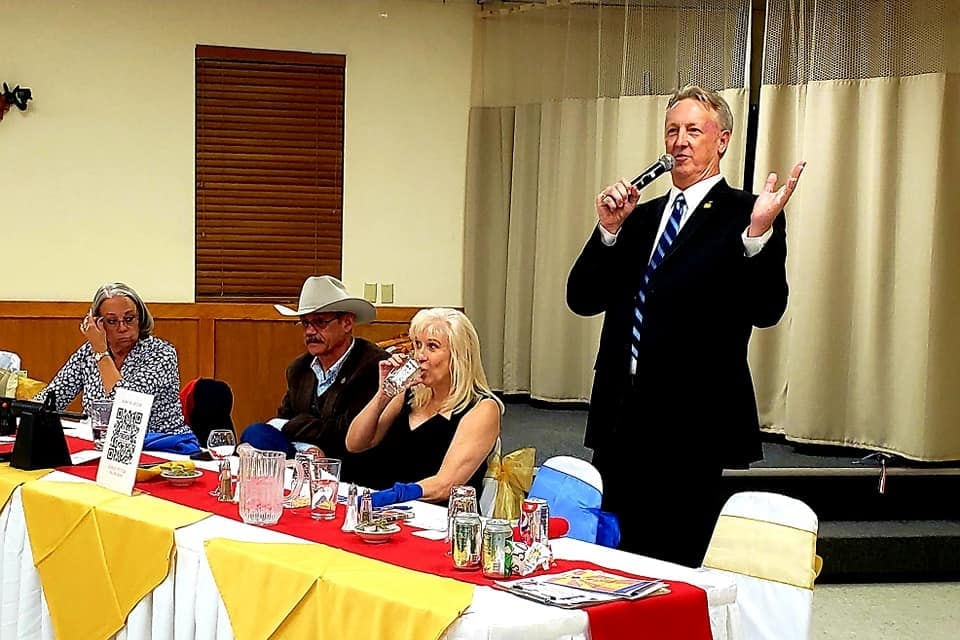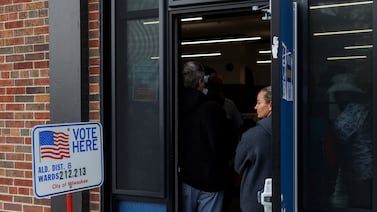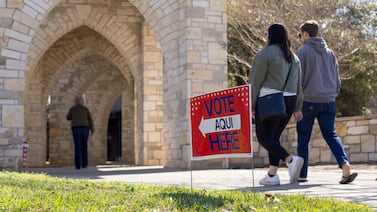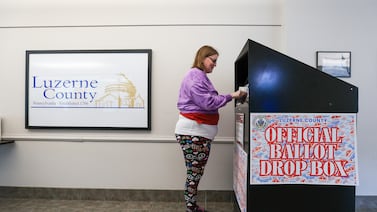David Stevens had never supervised a ballot count. He didn’t know how he would count nearly 50,000 ballots by hand, who would help, or where he would find enough space to do it.
But that didn’t dissuade him.
Less than a month before the November election, Stevens, the Cochise County recorder, told the county supervisors he would be happy to try.
Arizona GOP leaders had spent two years promoting unfounded claims about compromised vote-counting machines, and were scouring the state for a county that would willingly hand-count ballots. They found it in Cochise County, where Stevens grasped onto the idea, devised a plan, and stoked the sentiment starting to take hold locally.
The Republican recorder propelled the proposal to illegally hand count all midterm election ballots, thrusting a rural Arizona county known for historic mining towns and natural beauty into months of chaos, court hearings, and national headlines. Cochise’s two Republican supervisors bore the brunt of the backlash — threatened with jail time and, even now, facing a citizen-led recall effort. But the initial effort would have hit an abrupt stop without Stevens, who mostly remained behind the scenes.
Stevens, an affable former state lawmaker, is originally from Illinois but has spent enough time in rural Arizona to adopt a slight drawl and a penchant for Western wear. He has close connections with GOP state leaders who have worked to upend voting — including former Republican secretary of state candidate Mark Finchem — and a keen willingness to spread doubts about election security, experiment with proven processes, and test the boundaries of state law.
Together with the supervisors, Stevens allowed the county to become a test case for how to disrupt elections in 2024, according to local Democrats and officials at nonprofits focused on guarding elections.
“The fact that you have conspiracy theorists tinkering with the core functioning of systems that have worked so well is deeply, deeply alarming,” said Jared Davidson, counsel at Protect Democracy, a nonpartisan nonprofit, who said the events that played out in Cochise County boosted Arizona’s status as a “laboratory” for elections.
For his part, Stevens is more than willing to keep tinkering.
Finchem, whose campaign centered around the idea that elections are rigged, and Stevens both said they have been close for many years and share many views, such as a belief that mail voting and voting machines are insecure.
As recorder, Stevens plans to pursue a $1 million state grant orchestrated by Finchem to test high-tech security features on ballot paper, an idea that many election administrators consider costly and unnecessary.
Votebeat found that Stevens is a director of a Finchem-run nonprofit now called the Election Fairness Institute. It posts untrue statements about elections on its website and says it will rely on researchers who have become known for spreading false claims of widespread election fraud.
Stevens said that his initiatives and proposals are focused on improving transparency and security of elections. He runs his office in a nonpartisan and open manner, he said, and has defended the parts of the county’s election system he trusts.
Now, whether by design or default, Stevens is on the verge of gaining more power over how Cochise County’s elections are run.
Lisa Marra, the elections director who defended the system and refused to hand over ballots for an illegal hand count, is resigning because of what she said is harassment and a hostile work environment. This is likely her last week. Stevens acknowledged he might be asked to serve as interim elections director and said he would be willing.
Meanwhile, a Republican supervisor may propose reorganizing Cochise’s election administration altogether, which Marra understood to mean moving her duties under Stevens. Arizona law divides election duties between recorders and county supervisors. That means Stevens currently controls only early voting and voter registration. If supervisors give him oversight of the elections department, he would also take control of ballot design, ballot security, ballot counting, and Election Day procedures.
Bisbee resident Margot Walker said Marra’s presence this fall reassured her, but she now is worried about the future of her county’s elections.
“It’s very disconcerting to watch democracy go down the tubes,” she said, “And people are blindly following, with no basis in real information as to why.”
Flying under the radar
Low profile aside, Stevens has been making his doubts about the election system known since shortly after the 2020 election.
He’s not often quoted in the media. He doesn’t have public social media profiles. He has little to no public persona, said Elisabeth Tyndall, the county Democratic Party chairwoman.
“He has really flown under the radar in the county, as far as the election denialism,” she said. “Those of us who pay attention and read and see the connections have known that it is there.”
Stevens is a longtime resident of Sierra Vista, a city of about 45,000 near the Mexican border that includes a U.S. Army base, Ft. Huachuca. It’s by far the largest city in the county and its political power base, even though Bisbee, 30 minutes east, is the county seat.
As a state representative from 2009 to 2017, Stevens sponsored some bills that would change voting, but nothing as extreme as Republican proposals today. He wanted to cut down the nearly four-week early voting period by about a week, for example, and repeal an act that created rules for campaign finance donations and a nonpartisan commission meant to improve the integrity of elections.
After a career in information technology, he said he spent his four terms in the Legislature focused on improving transparency and technology in government.
In 2016, he won his race to replace the Democratic county recorder who had been in office for more than four decades, telling voters he would concentrate on cleaning up the voter rolls. He says he has succeeded in that, removing more than 30,000 people who had died or moved elsewhere. He won a second term unopposed.
After the 2020 election, as other Republican recorders in the state defended the security of elections, Stevens took a different path. He said he defended his own county’s election but couldn’t defend elections elsewhere in the state. In fact, he told the Arizona Daily Independent a few weeks after the election that he supported putting Arizona’s electoral votes on hold to look into potential vulnerabilities in Maricopa County’s election.
“Take several ballots that only have Trump ovals filled out, and feed them through the machine,” the paper quoted Stevens as saying. “If votes are reported for Biden you have a problem somewhere.” He didn’t note that Arizona law already requires counties to check that machines are counting votes accurately with a test before and after the election, and through the post-election partial hand-count audit.
On conservative radio, he criticized Maricopa County’s uncooperative response to the state Senate’s partisan and dysfunctional 2021 audit of the county’s election, and said the county needed better security practices. He also repeated a false claim that the county deleted election files.
Stevens said he prides himself on working with Republicans and Democrats and going to both parties’ events.
“I enjoy getting out in the public on Saturday afternoon, put a little shine in the boots, wear my cowboy hat, and go out there and try to answer every question they got,” Stevens said.
‘Happy to do it’
When hand-counting all ballots came up, Stevens publicly downplayed his role in promoting the plan.
“Let me start out with, I was asked to produce this presentation,” he said in October at the first work session where the supervisors publicly discussed the idea. “Happy to do it.”
The movement to hand-count ballots began shortly after Trump falsely claimed he lost the 2020 election because the machines that counted ballots were rigged in favor of Joe Biden.
In April 2022, as the primary election approached, Finchem and gubernatorial candidate Kari Lake filed a lawsuit claiming that the machines used to count votes in Arizona were inaccurate and insecure and asking the court to order that all ballots be counted by hand. That lawsuit was eventually dismissed, and the court ordered sanctions against the candidates’ attorneys.
Just after the August primary election, though, GOP leaders and activists began a campaign to push the hand-count idea, and county supervisors across the state received thousands of automated emails asking them to go ahead.
By late September, Stevens was trying to find a way to make a hand count happen in Cochise County, according to a Sept. 23 email obtained by Votebeat that Supervisor Peggy Judd sent to hand-counting advocates. “Along with Representative Griffin and David Stevens there is quite a flurry of investigation in what CAN be done to create a more confident electorate,” Judd wrote at the time.
Recorders in Arizona do not oversee ballot counting and results. That’s the responsibility of elections directors, who report to county supervisors. Stevens knew this, he told Votebeat in October, but he thought it was a good idea to have a public discussion about hand-counting ballots because he had heard from a lot of voters who liked the idea. He told voters to contact the supervisors and ask for a work session.
The supervisors had Stevens give a presentation on the topic, even though tabulating ballots is not part of his job. That’s because they knew that Marra would not be a willing participant, Judd said in an interview at the time.
During his presentation, Stevens made the idea of hand-counting all races on all ballots sound simple. He said that the county would proceed with the normal machine count, but then do a full hand-count audit after. He acknowledged it would cost money to hand-count ballots, but said machines cost money, too. He said it would take more people and more space, but described it as “very doable.”
Supervisors then pursued the full hand-count audit, despite warnings from the county attorney that it would be illegal. The two Republicans on the three-member board, Crosby and Judd, voted to move forward.
“Stevens was never like, ‘That’s not a good idea,’ ” Tyndall, the county’s Democratic chair, said. “He just jumped in with both feet, without really any plan on how to do it, or where. It was very confounding from my perspective.”
Election researchers and consultants generally advise against hand-counting ballots, because machine counts are proven to be more accurate and efficient. Doing a full hand count alongside a machine count could cast doubt among voters about the accuracy of the election, as well.
Hand-counting the 47,284 county ballots cast in November certainly would have taken weeks, potentially delaying the statewide certification deadline. Stevens would have also had to find a space large enough for hundreds of workers, recruit bipartisan teams willing to volunteer, and organize 24/7 security.
The secretary of state’s office sued the supervisors over the plan, including Stevens and Marra as defendants. They testified for different sides, with Marra stating it would be against the law to do a full hand count and Stevens defending the supervisors’ decision, saying that the Election Procedures Manual allowed them to do it.
In a court brief and testimony four days before the election, he outlined his plan, which he said included more than 300 volunteers and four potential locations. He said the county sheriff would help with security.
“I have a high level of confidence,” Stevens said. “At a basic level, it is a very simple process.”
When the judge asked him if the results of the hand count would be used as the final election results if the results were different, Stevens said he “would be bound to report what the audit produced.”
“What happened after that would be out of my hands,” he said.
The judge ruled that the full hand count would be illegal, citing in his order an Arizona Supreme Court decision that said, “when public officials, in the middle of an election, change the law based on their own perceptions of what they think it should be, they undermine public confidence in our democratic system and destroy the integrity of the electoral process.”
Stevens believes the judge “threw out” a line from the election procedures manual that would have empowered the supervisors to expand the hand count. That line says that “counties may elect to audit a higher number of ballots at their discretion.” But that’s in a section related only to early ballots, not all ballots.
Former Republican state Sen. Frank Antenori, who lives near the small Cochise County community of Dragoon, said the judge was wrong and the full hand count would have been legal. He said he knows Stevens as someone who follows the law.
“I don’t know if he champions anything other than doing it by the book,” he said.
Despite the ruling, Stevens, the day after the election, began preparing to move forward with an expanded hand count anyway, though something just short of a full hand count. He did so even though the supervisors had not publicly discussed this idea since the judge’s ruling. As concern spread about Stevens’ attempt, Marra reassured the public that the ballots were locked up.
“Security is safe in the ballot cage in warehouse under camera,” Marra told Votebeat the weekend after the election. “He does not have access to that building. Access is strictly limited.”
The expanded hand count never happened. The supervisors moved on to their next hurly-burly: refusing to certify the election results.
‘One of my best friends’
As the supervisors missed their certification deadline, Finchem and Lake were claiming fraud and refusing to concede their races.
“New election, recall everyone, overwhelm the polls,” Finchem tweeted the day of the certification deadline. “A disgrace,” he wrote when Maricopa County voted to certify its election. “Hey, look at this crime scene!” he wrote when Secretary of State Katie Hobbs canvassed the state election, including a manipulated photo of Hobbs and other state officials in orange jumpsuits.
Stevens said he doesn’t think Finchem’s views on voting are “that extreme.” He met Finchem while serving in the legislature.
“He is one of my best friends,” he said.
Finchem and Stevens share an inclination for cowboy hats and election doubts, but project different personas. Stevens is a towering man, standing 6-foot-5 but is soft-spoken and accommodating. Finchem, in contrast, is combative and rambling.
Finchem described Stevens as a man of fidelity and integrity. “He is always open to new ideas looking at how the electoral process functions,” Finchem said. “This is one small area of the relationship we have. He is trustworthy and that’s rare.”
In early July, Stevens was listed as a co-host for a fundraising event for Finchem at the Copper Queen Hotel in Bisbee, along with the hotel’s owner, according to an event flyer obtained by Votebeat. The event does not show up on Finchem’s campaign finance reports for that period, so there’s no mention of who paid for the decorations, food and drinks. Finchem did not respond to a question about who hosted the event, and the hotel owner did not return a phone call.
Stevens told Votebeat he was not a co-host of the event, he didn’t even attend, and he did not approve of his name being on the flyer.
“My name was attached to it without my knowledge.” Steven said. “I tried to get it off, but it was too late. I did not attend that fundraiser.”
A handful of protestors showed up to the event to demonstrate outside, and Finchem later posted a video of him walking out and yelling at the group, “Say hi, all you Marxists. Say hi.” Protestors told Votebeat the ballroom set up for the event was nearly empty.
Stevens said he doesn’t believe it’s ethical for recorders to support or run political campaigns, and he didn’t campaign for Finchem or endorse him.
But in September, the Arizona Daily Independent published a story about how Stevens publicly opposed Finchem’s rival Adrian Fontes, titled “County recorder says Adrian Fontes spread misinformation and fostered chaos.”
“As someone who has dedicated their entire life in service of the State and our nation, and who understands the importance of election integrity, I cannot remain silent and allow the voters of Arizona to cast their ballot for someone who regularly thumbs their nose at our laws and standards,” Stevens said in the article, referring to Fontes.
Stevens told Votebeat that if Finchem won, he would have considered becoming his chief technology officer. Finchem confirmed he wanted Stevens in that role. Instead, Stevens is now considering a run for state representative or senator in 2024.
Generally, election administrators who are elected face outside pressure from political parties, said Mitchell Brown, an Auburn University political science professor who studies election administration, but it’s their job to remain “neutral public servants.”
For the most part, they do, she said. But those who are considering running for higher office may be more tempted to court their party’s favor and get onboard with their party’s platform, Brown said.
“It’s an inherent tension for some people,” she said.
Finchem, Stevens, and an election nonprofit
Finchem and Stevens have a new initiative. Since 2018, Stevens has been listed as a director for a nonprofit Finchem runs. He said he serves in a consulting role and has not yet been paid for any work he has done for the nonprofit.
The nonprofit’s purpose has changed over time. At first, it was called Pathway Research and Education and its website said the focus was research on energy, education, tax, infrastructure policy, and land management. An archived version of the website from June to September 2022, which no longer exists, says it was trying to raise $1.6 million to support what it calls a multi-state national bus tour “to provide reality-based understanding of current threats to America in their local areas.” It told visitors to send checks directly to Finchem’s PO box in Phoenix.
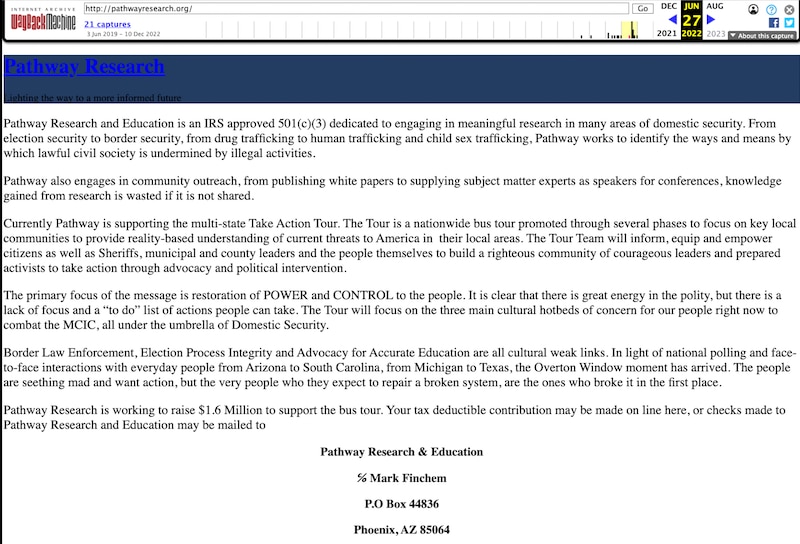
Recently, the nonprofit changed its name to Election Fairness Institute. Republican state Sen. Sonny Borrelli and state Rep. Leo Biasiucci were added as directors. Finchem said it will focus on looking at the relationships between people and defects in the elections process. He did not elaborate further.
The current website has numerous posts that repeat false claims about 2022 elections, including one headline that says, “10 Million Mail Ballots Unaccounted for in Nov. Midterms.” It says the organization will rely on research from Seth Keshel, an activist who has repeatedly made unfounded claims that his analysis of election data proves fraud.
Asked what the organization’s mission is, Stevens said, “There are a couple visions,” including “potentially a nationwide voter registration-type repository.” He said he sees no conflict in serving on the board and in a consulting role.
The website asks for donations to be sent to a post office box in Phoenix “to execute on our mission of examining ‘vote-by-mail’ affidavit envelope signatures for validity and professional signature match, to fund our daily operations including a limited staff and qualified professional subcontractors.”
The most secure election, Stevens says, would not involve any mail-in or early voting and would tally results by hand. He worries that he has no control over the ballots when they are out of the county’s custody, and he said he has found a few instances where the U.S. Postal Service has failed to properly track and deliver all ballots.
If people criticize him for not standing up for the security of elections, he said, they haven’t been listening to him. “I tell people that I don’t believe we had any issues in Cochise County whatsoever,” he said. “And I am more than willing to try to prove that. I have said that multiple times. I guess they want to ignore that comment.”
Asked if he was willing to say that Trump lost in 2020, he acknowledged Trump lost. But he quickly added that he can only be sure about Cochise County.
“I saw the videos of what they did in Pennsylvania and in Georgia, I wasn’t there, I wasn’t in charge of it,” he said. “I was in charge of it here.”
Experimenting with ballot security
Stevens is also pursuing an idea he and Finchem have been talking about since late 2020, he said, which is adding security features to ballot paper, such as watermarks or unique ballot identifiers.
Stevens gave Finchem a county ballot, to which a company added security features, for Finchem to use in a demonstration of the technology to state lawmakers. In October 2021, Stevens and Finchem went to Dallas for an event Finchem hosted called the Ballot Integrity Summit.
The state legislature last year approved $1 million in this year’s budget for a trial, specifically allowing county recorders to apply, even though elections directors, not county recorders, oversee the design of ballots or ordering ballot paper in Arizona.
The only recorder to apply: Stevens. He was awarded the grant and is starting to make a plan, he said.
Stevens said he also would be OK with hand-counting the county’s ballots in the future. Asked if he supports getting rid of the county’s tabulation machines, he said, “I’m willing to have that debate.” He and Finchem both believe that companies that manufacture such machines should make their source code public, something experts say would create new security vulnerabilities.
“They have been accurate to this point,” he said. “I have no problem testing them. I prefer to view the software.”
Protect Democracy’s Davidson said the type of experiments Stevens supports could have real consequences, such as the threat that a full hand count of ballots would make it impossible to meet statutory deadlines for certifying elections.
‘I can fill the role’
As Marra exits, Stevens may take control over parts of the system he wants to examine, such as the type of ballot paper the county uses and how ballots are counted.
The county has until Wednesday to respond to Marra’s resignation letter. After that, Marra can leave, and could potentially sue. The longtime deputy elections director retired in January. There’s only one other employee in the elections department, and that person has been there less than a year.
Before Marra’s resignation, Judd had proposed a Feb. 7 meeting to discuss hand-counting ballots, along with “better practices involving possible re-organization of responsible parties.” Her request appears to have been postponed or canceled, though.
Marra interpreted that request as the supervisors’ attempt to give Stevens control over much of her work. The discussion during that work session, her lawyer wrote, would continue to give the false impression the county’s elections had problems under her watch.
“The working conditions at Cochise County have become so intolerable and deteriorated to the point that Ms. Marra is compelled to resign to protect her health and safety,” Marra’s lawyer wrote in the resignation letter.
Stevens said he isn’t so concerned about the future of the department without Marra. He has six years’ experience in elections. He can handle whatever comes up, he said.
“I’m confident I can fill the role and get the job done.”

